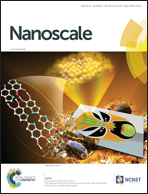Design of highly selective ethanol dehydration nanocatalysts for ethylene production†
Abstract
Rational design of catalysts for selective conversion of alcohols to olefins is key since product selectivity remains an issue due to competing etherification reactions. Using first principles calculations and chemical rules, we designed novel metal–oxide-protected metal nanoclusters (M13X4O12, with M = Cu, Ag, and Au and X = Al, Ga, and In) exhibiting strong Lewis acid sites on their surface, active for the selective formation of olefins from alcohols. These symmetrical nanocatalysts, due to their curvature, show unfavorable etherification chemistries, while favoring the olefin production. Furthermore, we determined that water removal and regeneration of the nanocatalysts is more feasible compared to the equivalent strong acid sites on solid acids used for alcohol dehydration. Our results demonstrate an exceptional stability of these new nanostructures with the most energetically favorable being Cu-based. Thus, the high selectivity and stability of these in-silico-predicted novel nanoclusters (e.g. Cu13Al4O12) make them attractive catalysts for the selective dehydration of alcohols to olefins.



 Please wait while we load your content...
Please wait while we load your content...